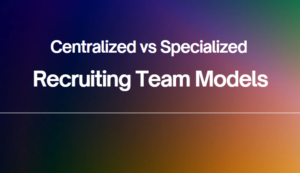
After your MBR meeting, a recruiting manager may decide to form specific teams based on the hiring needs that align with your business SLA requirements. You have two options for recruiting team models: a centralized team or a specialized team focused on niche roles. This article will outline the advantages of each approach, enabling you to determine which model best suits your company’s hiring needs and objectives.
Why choose a specific recruiting team model when creating a team?
Choosing a specific recruiting team model can help you to better align your hiring efforts with your business goals and objectives. By creating a team that is focused on a specific area, such as a centralized team or a specialized team focused on niche roles, you can improve the efficiency and effectiveness of your hiring process.
A centralized recruiting team can help to ensure consistency and standardization in your hiring practices, as well as enable better collaboration and knowledge sharing among team members. This model can be particularly useful for organizations with a large volume of hiring needs or those with a high degree of geographic dispersion.
On the other hand, a specialized recruiting team focused on niche roles can help to improve the quality of your hires and reduce the time-to-hire for these critical positions. This model can be particularly useful for organizations that have specific technical or industry expertise requirements, as well as those that have a limited number of positions to fill.
Ultimately, the choice of recruiting team model will depend on your specific hiring needs and objectives, as well as the size and structure of your organization. It is important to carefully consider these factors and weigh the advantages and disadvantages of each model before making a decision.
Centralized Recruiting Team model:
A centralized recruiting team model is an approach to building a recruiting team where all recruiting functions are managed by a single central team or department within an organization. In this model, the recruitment team is responsible for managing all aspects of the hiring process, from posting job openings and sourcing candidates to conducting interviews and making hiring decisions.
This approach is often used by larger organizations that have a high volume of hiring needs across multiple business units or geographic locations. By centralizing the recruitment function, these organizations can achieve greater consistency and standardization in their hiring practices, as well as improve collaboration and knowledge sharing among team members.
One of the key benefits of a centralized recruiting team model is that it enables organizations to leverage economies of scale in their recruiting efforts. By consolidating resources and expertise, the recruitment team can achieve greater efficiency and effectiveness in their hiring activities, which can help to reduce costs and improve overall hiring outcomes.
However, there are also some potential drawbacks to this approach. For example, a centralized recruiting team may not have the same level of expertise or knowledge of specific business units or job functions as decentralized teams. Additionally, the central team may struggle to develop close relationships with hiring managers and other stakeholders, which could lead to difficulties in understanding their needs and priorities.
Specialized Recruiting Team Model:
A specialized recruiting team model is an approach to building a recruiting team where the focus is on hiring for specific job functions or roles within an organization. In this model, recruiting teams are organized around specific areas of expertise or job families, such as engineering, sales, or marketing.
This approach is often used by organizations that have a specific hiring need or a limited number of positions to fill in a particular area. By creating a specialized team focused on these roles, the organization can leverage the expertise and knowledge of these recruiters to identify, attract, and hire the best candidates for these positions.
One of the key benefits of a specialized recruiting team model is that it enables organizations to develop a deep understanding of the specific skills and competencies required for different job functions. This allows recruiters to identify and attract candidates with the right qualifications and experience, which can lead to better hiring outcomes and improved performance for the organization.
Another advantage of this approach is that it enables recruiters to build close relationships with hiring managers and other stakeholders in specific job functions or areas. This can help to ensure that the recruiting team has a clear understanding of the business needs and priorities in these areas, which can help to improve the quality of hires and reduce time-to-hire.
However, there are also potential drawbacks to this approach. For example, specialized recruiting teams may have limited visibility into hiring needs across the organization, which could result in missed opportunities to leverage talent across different areas. Additionally, if the organization’s needs change or if a specialized team is not able to fill open positions, there may be a need to shift resources or change recruiting strategies.
The choice of your recruiting team model will depend on the volume and complexity of your sourcing needs. From my personal experience of working with both team models, I tend to prefer a more specialized recruiting approach, which focuses on niche roles rather than continuously conducting high-volume interviewing events every month.
Recommended Reading:
- Unlocking the Power of Perplexity AI: Why Recruiters Should Utilize This Revolutionary Tool - February 11, 2024
- Exploring AI Interviewing Assessment Tools: A Comprehensive Review - November 30, 2023
- PartyRock a Sandbox for Talent Sourcing - November 29, 2023
